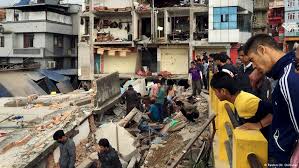
Aid agencies are warning that a lack of shelter, contaminated water and poor sanitation in the aftermath of the Nepal earthquake could lead to potentially serious outbreaks of disease.
There have already been reports of diarrhoeal disease outbreaks and chest infections. DEC member agencies say they're working not just to provide better emergency shelter but to ensure that drinking water and sanitation are a key part of the emergency response. The scale and cost of this aspect of the response is still being assessed but it is clear is that action is needed now – ahead of the rainy season that starts in June.
Contaminated drinking water and a sanitation crisis could lead to cholera, dysentery, and other water-borne disease outbreaks. Cholera is endemic in Nepal so an outbreak would not be unprecedented: last year, 600 people caught cholera, and in 2009 a major outbreak affected more than 300,000 people.
DEC member agencies are leading the relief work in water, sanitation and hygiene (WASH) to ensure that families affected by the earthquake have access to safe water by:
- Delivering trucks of water to camps to provide safe drinking water for displaced people
- Establishing toilets in camps
- Distributing family hygiene kits and providing information on the importance of hand washing
Glynnis Brooks, Head of Health and WASH at British Red Cross, said: “Water and sanitation remain critical at this stage of the disaster, as those affected are generally much more susceptible to illness and death from disease. We are working to ensure that safe water is available to drink, cook with, and use for personal hygiene purposes. This is essential in order to prevent dehydration, and water-related disease such as diarrhoea and cholera.
“Communal latrines need to be constructed immediately in order to prevent further contamination of limited water supplies and provide for displaced populations, those without shelter or no access due to damage. Given the scale of the damage to infrastructure near the epicentre of the quake, rehabilitation of water supplies will take time, so it is essential that humanitarian agencies assist the government by providing people affected with clean, safe water supplies.”
Yeeshu Shukla, Emergency Programme Officer at Christian Aid said: "The challenge we all have is meeting these needs for such a large number of people, most of whom are in remote villages, cut off by destroyed infrastructure. Not only is it vital for people to have safe drinking water to survive but also when access to healthcare is such a problem, stopping the spread of disease is paramount."
Nepal is one of the world's poorest countries and does not have the infrastructure and resources to deal with a crisis of this magnitude. Half of the 28 million people in Nepal don't have access to improved sanitation and live below the poverty line, around one in three of them is in severe poverty. Their ability to cope with a major disaster is crippled by the lack of economic and social infrastructure that people in richer nations take for granted. Many thousands of Nepalese are going to need a great deal of help.
DEC Member Agencies are already responding to the need for water and sanitation:
- The British Red Cross has sent a mass sanitation response to support the needs of over 20,000 people who have been affected by the earthquake. Latrines, showers and tools to dig latrines in rural areas are being sent along with hygiene promotion materials, such as water treatment tablets, soap and disinfectant.
- Oxfam is already providing water and sanitation in four camps in the Kathmandu Valley. The charity has been out delivering aid for over a week, working with the Nepalese army to build 50 latrines, providing shelter and clean water and handing out hygiene kits to families. 12 tonnes of humanitarian aid is on its way from Oxfam’s Bicester Warehouse and should be on the ground on Tuesday.
- Action Aid has distributed disinfectant kits for cleaning to 2,500 people in Khokana and Paanga just outside Kathmandu.
- CAFOD is specialising in WASH and hygiene. CAFOD has already deployed a specialist team to provide technical expertise around water, sanitation and hygiene management.
- CARE is delivering, jerry cans and hygiene items such as soap and is also distributing water purification tablets to people who are particularly susceptible to water-borne illness such as diarrhoea.
- Christian Aid has distributed 10 water filtration units – each providing 1,500 litres of purified water per hour. It has despatched 74,000 water purification sachets and one million water purification tablets.
- Concern Worldwide has handed out 2,000 jerry cans and hygiene kits,
- Plan International is working with children and the most vulnerable groups through its WASH work.
To make a donation to the DEC Nepal Earthquake Appeal visit: http://www.dec.org.uk, call the 24 hour hotline on 0370 60 60 900, donate over the counter at any high street bank or post office, or send a cheque. You can also donate £5 by texting the word SUPPORT to 70000.

 10°C
10°C
 10°C
10°C